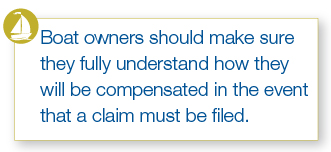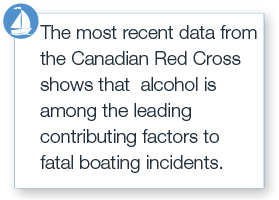According to recent data from the Canadian Red Cross, recreational watercraft use accounts for 86 percent of all boating fatalities in the country – with these figures trending in the wrong, upward direction. This translates into scores of avoidable deaths each year, as well as millions of dollars in property damage.
As we emerge from a trying winter that was the coldest on record for parts of the country (Montreal, Quebec just recorded the chilliest February in the city’s history), the desire to take to the open water for a little fun in the sun is completely understandable. But before you and your loved ones set sail, the statistics above make it clear that proper boat insurance coverage is a must for all watercraft owners.
What is Boat Insurance?
This type of product provides coverage for boat owners in the event of a loss. This coverage is extended to all motorized water vehicles, including fishing boats, pontoon boats, yachts and jet skis. Boat insurance does not encompass watercrafts such as canoes, kayaks and paddle boats.
What Does Boat Insurance Cover?
Coverage includes protection for physical damage – the ability to repair or replace your boat if it is accidentally damaged or destroyed. Boat insurance can also include liability coverage if you are held legally responsible for damages to property or injury to someone other than yourself or a family member. Medical payments can also be included for medical costs should someone be injured aboard your watercraft.
As with most insurance policies, special coverage can be added as needed or desired. These provisions may include total loss replacement, emergency towing, uninsured boater protection, personal effects coverage and coverage for fishing equipment.
 Information is the Best Form of Security
Information is the Best Form of Security
Boat owners should make sure they fully understand how they will be compensated in the event that a claim must be filed. For instance, actual cash value policies will pay the insured the depreciated value of their boat in the event of a loss. An agreed amount policy will pay up to a specified amount listed in the policy.
Make sure you know and understand your deductible(s). A deductible applies to physical damage to your boat when it is damaged or stolen. Different deductibles may apply to your hull, to special coverages, and to named storms.
Another issue for boat owners to take into account is the navigational limitations imposed by a policy. Some insurance policies may only provide coverage in inland waterways, while another may only offer coverage in coastal waters. These limitations can also affect how far offshore a boat may travel and still be protected, or what time of year it is allowed in certain waters. Understanding these limitations is essential for boat owners looking to protect themselves and their investment. If you use your boat beyond the policy's navigational limits, a claim may be denied.
Prevention is Always Better than ResolutioN
The best way to keep a boat and those riding in it protected is to avoid accidents altogether. While it may be impossible to predict and avoid every mishap, there are plenty of strategies that can be employed to increase boating safety.
Training
Boat owners should become experts with their watercraft and proper use. Courses are available for boaters of all skill levels to become familiar with safety regulations, provincial requirements and general information. Boating is always more enjoyable when property is safe and no one gets hurt.
Be Proactive
Boat owners should make sure they and their passengers are prepared before heading out on a journey. This means ensuring a boat has enough fuel, is in good working condition and safety equipment is in working order. Always have a backup captain, or someone who can operate your boat in the event you are unable.
Listen to Mother NaturE
Weather conditions can have a huge impact on the safety of a boating trip. Owners should avoid boating in volatile weather, which can include conditions like rough or changing winds, storms or sudden drops in temperature.
There’s No Watercraft Catastrophe that Alcohol Won’t Worsen
 Alcohol consumption greatly increases a boater's chances of getting into an accident. The most recent data from the Canadian Red Cross shows that alcohol is among the leading contributing factors to fatal boating incidents. Additionally, the effects of prolonged water time on the body, from forces like sun exposure and high winds, can exacerbate the effects of alcohol.
Alcohol consumption greatly increases a boater's chances of getting into an accident. The most recent data from the Canadian Red Cross shows that alcohol is among the leading contributing factors to fatal boating incidents. Additionally, the effects of prolonged water time on the body, from forces like sun exposure and high winds, can exacerbate the effects of alcohol.
Use Good JudgmenT
Above all, using sound judgment is the best way to avoid accidents. This means traveling at a safe speed, being extra cautious in crowded areas and generally taking the safety of all individuals into account.
Before heading out on the water, watercraft owners should contact a HUB International broker to explore their insurance options and to design a policy for their specific needs. HUB specializes in boat insurance including coverage for small dinghies, large yachts, charter boats, racing sailboats and everything in between.